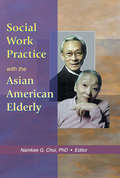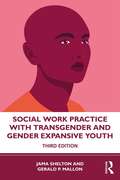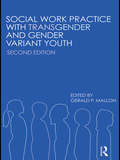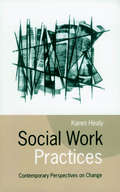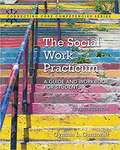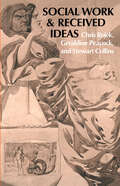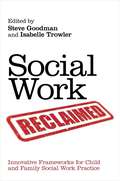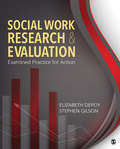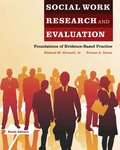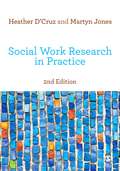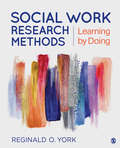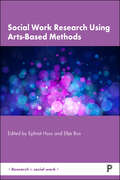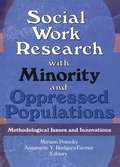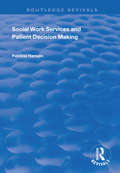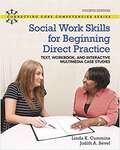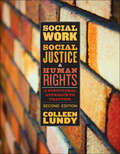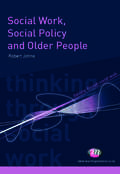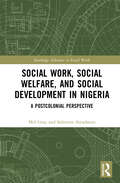- Table View
- List View
Social Work Practice with the Asian American Elderly
by Namkee G ChoiThis fascinating book addresses the cultures and concerns of five major ethnic groups: Chinese, Japanese, Korean, Asian Indian, and Vietnamese. Social Work Practice with the Asian-American Elderly examines the diverse needs of this rapidly growing population. It suggests interventions and service-delivery models that are culturally sensitive and appropriate for these clients, many of whom are first-generation immigrants still closely linked with their cultures of origin. This comprehensive book serves as a timely resource for both researchers and practitioners concerned with this neglected yet rapidly growing segment of the elderly population. Social Work Practice with the Asian-American Elderly offers both quantitative and qualitative research on essential topics, including: migratory grief assimilation depression elderly nutrition programs social support
Social Work Practice with Transgender and Gender Expansive Youth
by Jama SheltonThis fully revised third edition explores the childhood and adolescent experiences of transgender persons, providing foundational knowledge for social workers and related professions about working with trans and gender expansive youth. Organized through the lens of four distinct forms of knowledge – knowledge of lived expertise, community-based knowledge, practice knowledge, and knowledge obtained through formal/traditional education – this text balances discussion of theory with a range of rich personal narratives and case studies. Updates and additions reflect recent changes to the WPATH guidelines and the NASW Code of Ethics, include brand new material examining the origins of gender identity and non-binary identities, explore intersectional identities, and offer expanded content considering trauma-informed interventions and ethical issues. Each featuring at least one trans or gender expansive author, chapters present concrete and practical recommendations to encourage competent and positive practice. With a focus on both macro and micro social work practice, this book will be a valuable resource to any social service practitioners working with children or adolescents.
Social Work Practice with Transgender and Gender Variant Youth
by Gerald P. MallonThrough personal narratives and case studies, this fully updated second edition explores the childhood and adolescent experiences of transgendered persons. Addressing the differences between male-to-female (MTF) and female-to-male (FTM) individuals and identifying the specific challenges of transgender persons from diverse races, cultures, and religious backgrounds, this compelling book offers suggestions that will help social workers and the youths' families learn more about the reality of transgender persons' lives. Some of the areas discussed include: individual practice group work practice family-centered practice internal and external stress factors a new discussion of the legal issues that trans and gender variant youth face a new chapter on focusing on a recommendations for clinical treatment. Containing invaluable information on a topic that is not widely discussed or written about, the second edition of Social Work Practice with Transgender and Gender Variant Youth discredits negative stereotypes surrounding these youths and offers you insight into their experiences. Additionally, the chapters openly address questions that practitioners may have about gender identity as well as offer concrete and practical recommendations about competent and positive practice with this population. It will interest academics and social service practitioners seeking to know more and work effectively with transgender and gender variant youth.
Social Work Practices: Contemporary Perspectives on Change
by Dr Karen Healy`Karen Healy has written a very interesting and worthwhile book that explores the relevance and significance of postmodern theory to social work. It provides a well-argued account of recent developments in social work theory... However, it is not simply an account of theory, as considerable effort goes into making links between the theory and its implications for practice. ...[I]t offers a sound foundation for exploring issues of theory and practice. A major strength of the book is that it shows that some of the significant flaws in earlier attempts to develop critical approaches to practice should not lead us to assume that radical approaches are necessarily oppressive in themselves, or doomed to failure... It should serve its purpose well in prompting educators, policy-makers and practitioners to begin to take on board the critique of dominant approaches to social work theory and to help us guard against the dangers of dogmatism and orthodoxy' - European Journal of Social Work `Karen Healy profoundly challenges, in the context of the postmodernity of late capitalism, many of the assumptions upon which the critical tradition in social work has been founded. This is a book which interrogates not only the emancipatory metanarratives of left perspectives from her position within the left, but also questions many of the received ideas about her professional power and identity, and about the kinds of social work practices necessary in order to continue to pursue welfare as an emancipatory project under transformed ideological and material circumstances. This is a most significant contribution to the debates which confront social work, worldwide, at the present time' - Peter Leonard, McGill University, Canada How should social workers be responding to the crises which beset the welfare states of the 21st century? Could postmodern theory provide some of the answers? This original and stimulating book provides a critical review of contemporary social work theory and considers its relevance for professional practice. Karen Healy outlines critical theoretical perspectives - including feminist, Marxist and radical social work - and indicates their implications for social work practice. She explains contemporary debates on post-structuralism and postmodernism and shows how their application to everyday social work practice would point to a new pragmatism focused on local, contextual and incremental proposals for change. By referring to actual examples, she invites the reader to consider the potential for relevant and diverse forms of social work practice informed by postmodern theory. This accessible and engaging book makes an important contribution to contemporary debates on social work theory and practice. It will be important reading for students and academics in social work and social policy.
The Social Work Practicum: Preparation For Practice
by Cynthia GarthwaitThe Social Work Practicum helps prepare students for professional practice by providing a structured and yet individualized map for gaining the competencies required of social work professionals. The format integrates theory and practice to walk readers through the process of acquiring knowledge, developing skills, and enhancing social work values at both the BSW and MSW levels. The author highlights social work practice themes and Council on Social Work Education competencies and behaviors in a concise and usable way, viewing all of these topics through the lens of practicum. The chapters are sequenced to allow for ongoing professional development, while clarifying expectations for applying knowledge and providing experiential learning opportunities that lead to professional growth. The 8th Edition includes an increased emphasis on the preparation for social work practice. The author has expanded and updated information on diversity and working across differences; the use of technology; working with involuntary clients; social work theories and models; communication skills; and the planned change process.
The Social Work Practicum: A Guide And Workbook For Students
by Cynthia GarthwaitIn the new edition of Cynthia Garthwait’s The Social Work Practicum, theory and practice combine to offer a unique format for understanding, structuring, implementing, and evaluating practicum experience at both the BSW and MSW levels. This book provides a structured and yet individualized map for gaining the competencies required of social work professionals. The format integrates theory and practice to walk readers through the process of acquiring knowledge, developing skills, and enhancing social work values, and the unique format provides a solid background for understanding, structuring, implementing, and evaluating practicum experiences at both the BSW and MSW levels. The chapters are sequenced to allow for ongoing professional development, while clarifying expectations for applying knowledge and providing experiential learning opportunities that lead to professional competencies. <P><P> This edition offers new content on such important topics as professional licensing, organizational communication, planned change process, evaluation of practice, trends in social policy relevant to social work, social problem analysis, social policy formation, and leadership. The Enhanced Pearson eText features embedded video and assessments.
Social Work, Psychiatry and the Law: Second Edition (Routledge Revivals)
by N.N. Pringle P.J ThompsonFirst published in 1999, this volume is a revision of an earlier edition, after which there has been a virtual transformation in the provision of mental health services, examining issues including disturbances in children and adolescents, severe and enduring mental illness, drugs, ethical issues and developing a psychotherapeutic approach to approved social work. Many asylums have been closed, community care has been introduced and law, policy and practice have necessitated institutional change although, at an operational level, resources and perceptions have not always kept pace with change, resulting in increased levels of stress and, sometimes, public tragedy. This revision attempts to reconsider these changes from a social work perspective, along with contributing to the debate on professional and interprofessional practice.
Social Work & Received Ideas
by Chris RojekFirst published in 1989. Routledge is an imprint of Taylor & Francis, an informa company.
Social Work Reclaimed
by Isabelle Trowler Edited by Steve GoodmanReclaiming Social Work (RSW) is a radical new system for delivering child and family social work in the UK. The system was first piloted in the London Borough of Hackney and the model has gained national recognition. At the heart of this innovative system is the endeavour to keep children together with their families. This book sets out what the Reclaiming Social Work model is, how it was implemented, and how it works. It explains the RSW system of social work 'units' made up of clinicians and therapists and headed by a consultant social worker, and demonstrates how it has worked in practice. The evidence base and theories underlying the model are also explained. Several chapters are written by consultant social workers with extensive experience of working within RSW, which outline the methodological approaches used. This book on a pioneering new social work model will be of great interest to social work managers, policymakers and academics.
Social Work Research and Evaluation: Examined Practice for Action
by Professor Elizabeth G. DePoy Stephen F. GilsonSocial Work Research and Evaluation applies systematically developed research knowledge to social work practice and emphasizes the “doing” of social work as a reciprocal avenue for generating research evidence and social work knowledge. Using the Examined Practice Model, authors Elizabeth G. DePoy and Stephen F. Gilson present research as the identification of a problem and then proceed to evaluate the efficacy of social work practice in its resolution. Diverse theories, actions, and sets of evidence from a range of professional and disciplinary perspectives are included to underscore the importance of integrating evaluation and practice in research.
Social Work Research and Evaluation: Examined Practice for Action
by Professor Elizabeth G. DePoy Stephen French GilsonSocial Work Research and Evaluation applies systematically developed research knowledge to social work practice and emphasizes the “doing” of social work as a reciprocal avenue for generating research evidence and social work knowledge. Using the Examined Practice Model, authors Elizabeth G. DePoy and Stephen F. Gilson present research as the identification of a problem and then proceed to evaluate the efficacy of social work practice in its resolution. Diverse theories, actions, and sets of evidence from a range of professional and disciplinary perspectives are included to underscore the importance of integrating evaluation and practice in research.
Social Work Research and Evaluation (9th Edition)
by Richard M. Grinnell Yvonne A. UnrauOver thirty years of input from instructors and students have gone into this popular research methods text, resulting in a refined ninth edition that is easier to read, understand, and apply than ever before. Using unintimidating language and real-world examples, it introduces students to the key concepts of evidence-based practice that they will use throughout their professional careers. It emphasizes both quantitative and qualitative approaches to research, data collection methods, and data analysis, providing students with the tools they need to become evidence-based practitioners.
Social Work Research in Practice: Ethical and Political Contexts
by Heather D'Cruz Martyn JonesThis new edition of Social Work Research in Practice: Ethical and Political Contexts explores the intrinsic connection between knowledge, research and practice in social work. The authors argue that through a better appreciation of research, the highest standards of social work can be achieved. The second edition investigates contemporary approaches which impact on the discourses of social work research, including: - Evidence-based practice - User-led research - Anti-oppressive practice - Practice-based research Each chapter has been fully updated with a rich range of case examples and references. Further reading is also included, so that readers can expand their knowledge. This book is a valuable resource for both undergraduate and postgraduate students, as well as practitioners working in the field of social work. Heather D'Cruz works as a Consultant: Research and Professional Education. Martyn Jones is Associate Dean at RMIT University.
Social Work Research Methods: Learning by Doing
by Reginald O. YorkSocial Work Research Methods: Learning by Doing is a step-by-step journey through the process of conducting research. With over 30 years of teaching experience, author Reginald O. York helps readers discover how research can enable them to better serve clients in the field. Each chapter features a hands-on approach to producing research, with practical chapter exercises that reinforce methods mastery. Using their own data, students engage in realistic research activities and gain an appreciation for science-informed practice as a means of evaluating client outcomes.
Social Work Research Methods: Learning by Doing
by Reginald O. YorkSocial Work Research Methods: Learning by Doing is a step-by-step journey through the process of conducting research. With over 30 years of teaching experience, author Reginald O. York helps readers discover how research can enable them to better serve clients in the field. Each chapter features a hands-on approach to producing research, with practical chapter exercises that reinforce methods mastery. Using their own data, students engage in realistic research activities and gain an appreciation for science-informed practice as a means of evaluating client outcomes.
Social Work Research Proposals
by Richard Grinnell Yvonne UnrauThis book describes how to do a social work research proposal on a step-by-step basis.
Social Work Research Using Arts-Based Methods (Research in Social Work)
by Ephrat Huss and Eltje BosThis book explores the rationale, methodologies, and results of arts-based approaches in social work research today. It is the first dedicated analysis of its kind, providing practical examples of when to choose arts-based research, how the arts are used by social work researchers and integrated with additional methods, and ways to evaluate its efficacy. The multiple examples of arts-based research in social work in this book reveal how arts methods are inherently connected to the resilience and creativity of research participants, social workers, and social work researchers. With international contributions from experts in their fields, this is a welcome overview of the arts in social work for anyone connected to the field.
Social Work Research with Minority and Oppressed Populations: Methodological Issues and Innovations
by Miriam Potocky Antoinette Y Rodgers FarmerLearn the latest and most effective strategies and ideas so you can accurately research oppressed and minority populations!Social Work with Minority and Oppressed Populations: Methodological Issues and Innovations provides social workers, social work researchers, and graduate students with new methodologies for researching topics related to minority and oppressed populations. You will learn how to conduct research with such special populations as ethnic and racial minorities, elders, women, and gay and bisexual men utilizing proven techniques that will yield more precise data and help retain participants in the research program.A must for anyone involved in the field of social work, Social Work with Minority and Oppressed Populations tackles the unique challenges you may face in conducting research with cross-culture populations. This valuble text offers innovative and practical techniques for this type of research, including: methodological issues addressed within the framework of operationalization and conceptualization, measurement, research design, data collection, and data analysis how using the anonymous enrollment technique can be applied to intervention research to engage and retain respondents in case studies how Rasch Analysis, a statistical method, may discern differences in the subjective experiences of members of different racial groups specific examples of how constituent involvement in research projects enhances access to respondents and increases the validity of data why social work practitioners as well as social work researchers must evaluate their knowledge, attitudes, and skills when dealing with cross-cultural populations Discussions on ethical and political issues This compilation of research on methodological issues not only introduces you to new techniques for working with oppressed or minority populations, but also creates new questions and areas of study, such as how to develop culture-specific instruments that better measure depression and its expression among African-American and white populations. Social Work with Minority and Oppressed Populations will provide you with the correct methods and strategies to research cross-culture populations and enable you to address specific problems that different ethnic groups and minorities face.
Social Work Science
by Ian ShawWhat is the role of science in social work? Ian Shaw considers social work inventions, evidence-based practice, the history of scientific claims in social work practice, technology, and social work research methodology to demonstrate the significant role that scientific language and practice play in the complex world of social work.By treating science as a social action marked by the interplay of choice, activity, and constraints, Shaw links scientific and social work knowledge through the core themes of the nature of evidence, critical learning and understanding, justice, and the skilled evaluation of the subject. He shows specifically how to connect science, research, and the practical and speaks to the novel topics this integration introduces into the discipline, including experience, expertise, faith, tacit knowledge, judgment, interests, scientific controversies, and understanding.
Social Work Services and Patient Decision Making (Routledge Revivals)
by Patricia HansenFirst published in 1998, this timely study of an American acute care hospital examines decision making by patients and their families along with a cost analysis of social work services. The first part focuses on the patient’s experience of acute hospital care and the second part examines the factors which influence the use of social work resources in providing services to acute hospital patients. Patients were asked about the treatment and discharge decisions made, the agreements that occurred and the problems they experienced while they were in the hospital and after discharge. Surprisingly, the patients reported little difficulty with the decision making environment although it was evident that many experienced a high level of difficulty once discharged. The second part focuses on the utilization of social work resources for these patients. The study uses an activity based framework to examine the cost drivers for social work intervention. It is the first example of the application of ideas from activity based costing to analysis of social work services in hospital settings. Patricia Hansen’s interviews enable us to listen to the voices of those using social work services and the influences on their decision making, presenting a ground-breaking analysis of social work drivers. The findings question what can truly be achieved in such a brief period of time and Hansen presents several sound suggestions to provide comprehensive and effective psychosocial services for patients and families. Her study serves as a gold standard for future social work research on this issue.
Social Work Skills For Beginning Direct Practice: Text, Workbook And Interactive Multimedia Case Studies
by Linda Cummins Judith SevelGuide students through all stages of the helping process and assist them in developing time-tested social work skills. Social Work Skills for Beginning Direct Practice: Text, Workbook and Interactive Multimedia Case Studies, Fourth Edition, provides social work students with the social work practice knowledge and skills required for engaging in a successful helping process with clients. The integrated text, workbook, and interactive multimedia cases allow students to explore how to use social work skills in each stage of the helping process―from engagement and intake through termination. Students learn about attending behaviors, basic interviewing skills such as lead-in responses, paraphrasing, and reflection of feelings, and more advanced skills such as confrontation and summarization. Students then learn how to apply these essential interviewing skills in order to work effectively with diverse client groups. Social work theory, policy, therapeutic approaches, and evaluation techniques are integrated throughout the book to provide the essential elements of direct social work practice. The new edition includes expanded content on cultural competency, cultural awareness, evaluation, and client termination and keeps students up-to-date with the information they need to provide thorough, effective, direct social work practice with diverse client groups.
Social Work Skills with Adults
by Andy MantellSocial work practice with adults has been undergoing a major change in recent years. The traditional divisions between health and social services have been gradually eroded, with the shift to the single assessment process and with social workers increasingly finding themselves employed within the health or independent sector. Therefore, knowing the full range of social work skills is vital and central to good practice with adult service users. This new guide will help students to understand these skills and includes chapters on intervention, empowerment and advocacy, skills for collaborative working, self-presentation and much more.
Social Work, Social Justice, and Human Rights: A Structural Approach to Practice, Second Edition
by Colleen LundySocial workers take pride in their commitment to social and economic justice, peace, and human rights, and in their responses to related inequalities and social problems. At a time when economic globalization, armed conflict, and ecological devastation continue to undermine human rights and the possibilities for social justice, the need for linking a structural analysis to social work practice is greater than ever. The second edition of this popular social work practice text more fully addresses the connection between social justice and human rights. It includes a discussion of social work's role in promoting peace and responding to environmental problems. It also places a greater attention on the links between social work theories/concepts and practice skill/responses. The text has been updated and revised throughout with four new chapters: social work and human rights, cultural competence and practice with immigrant communities, social work and mental health communities, and practice with couples and families. Detailed case studies demonstrate the integration of theory, policy, and practice.
Social Work,Social Policy,and Older People (Thinking Through Social Work Series)
by Robert JohnsIt is essential for social work students to know about social policy, to know why studying social policy is important in the social work degree, and to understand how social policy, when implemented, has a real impact on the everyday life of vulnerable people. This book provides plenty of examples of this impact, tracing the development of welfare provision for older people right through the twentieth century, leading up to an analysis of contemporary developments, which students will need to know about in order to practice effectively.
Social Work, Social Welfare, and Social Development in Nigeria: A Postcolonial Perspective (Routledge Advances in Social Work)
by Mel Gray Solomon AmadasunThis groundbreaking book provides a comprehensive account of social work, social welfare, and social development in Nigeria from a postcolonial perspective. It examines the historical development of social work and social welfare and the colonial legacies affecting contemporary social welfare provision, development planning, social work practice, and social work education. Against this historical backdrop, it seeks to understand the position of social work within Nigeria’s minimalist structure of welfare provision and the reasons why social work struggles for legitimacy and recognition today. It covers contexts of social work practice, including child welfare, juvenile justice, disabilities, mental health, and ageing, as well as areas of development-related problems and humanitarian assistance as new areas of practice for social workers, including internally displaced and trafficked people, and their impact on women and children. It seeks to understand Nigeria’s ethnoreligious diversity and indigenous cultural heritage to inform culturally appropriate social work practice. This book offers a global audience insight into Nigeria’s developmental issues and problems and a local audience – social science and human service researchers, educators, practitioners, students, and policymakers ‒ a glimpse of what’s possible when people work together toward a common goal. It will be of interest to all scholars and students of social work, development studies and social policy.
